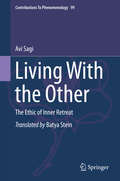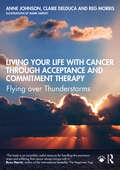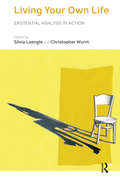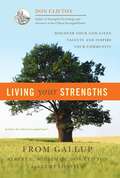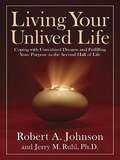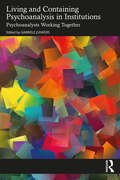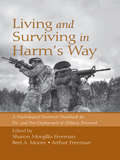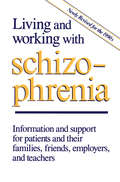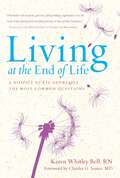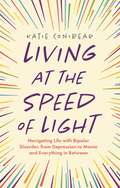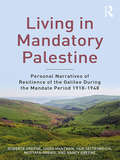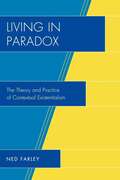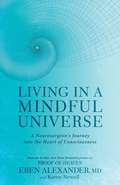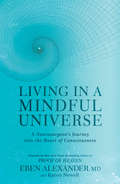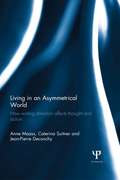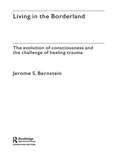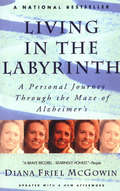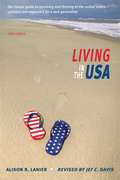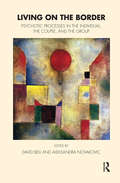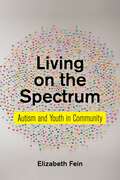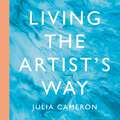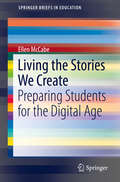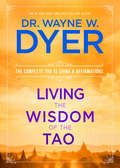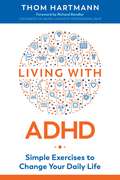- Table View
- List View
Living With the Other: The Ethic of Inner Retreat (Contributions To Phenomenology #99)
by Avi SagiThe book grapples with one of the most difficult questions confronting the contemporary world: the problem of the other, which includes ethical, political, and metaphysical aspects. A widespread approach in the history of the discourse on the other, systematically formulated by Emmanuel Levinas and his followers, has invested this term with an almost mythical quality—the other is everybody else but never a specific person, an abstraction of historical human existence. This book offers an alternative view, turning the other into a real being, through a carefully described process involving two dimensions referred to as the ethic of loyalty to the visible and the ethic of inner retreat. Tracing the course of this process in life and in literature, the book presents a broad and lucid picture intriguing to philosophers and also accessible to readers concerned with questions touching on the meaning of life, ethics, and politics, and particularly relevant to the burning issues surrounding attitudes to immigrants as others and to the relationship with God, the ultimate other.
Living Your Dreams
by Gayle DelaneyThe most important thing you will find in these pages is a new method of dream interpretation which is elegantly simple and extraordinarily accurate. The method, called dream interviewing, minimizes the interpreter's distortions and maximizes the dreamer's ability to discover the highly personal and specific meaning of the dream. With practice, both beginners and professionals will discover that dream interviewing techniques will shorten the time necessary to understand a dream and will heighten the dreamer's appreciation for the practical application of the intuition, objectivity, and creativity so abundant in the sleeping mind. You needn't wait years for the good fortune of helpful and beautiful dreams; you can call them forth tonight, or almost any night you wish, by incubating them.
Living Your Life with Cancer through Acceptance and Commitment Therapy: Flying over Thunderstorms
by Anne Johnson Claire Delduca Reg MorrisThis valuable self-help book for people affected by cancer, their loved ones and friends focuses on self-care when life hurts. It explores the impact of cancer and explains why the usual ways of coping may leave people stuck. The first book of its kind to focus on the scientifically based Acceptance and Commitment Therapy (ACT) approach, it helps people to find ways to cope with painful thoughts and feelings, and to rebuild a meaningful life despite the cancer. With an emphasis on value-based living the book illustrates skills such as mindfulness and the development of acceptance to help people affected by cancer to participate in a fuller life and gain a greater sense of well-being. It combines evidence-based practice with the experiences of people who are living with cancer in the form of numerous quotations throughout, as well as paper and pencil ‘thought’ exercises. Living Your Life with Cancer through Acceptance and Commitment Therapy helps people affected by cancer to feel more able to sit with the uncertainty of their future, show themselves kindness and compassion and to learn to be true to themselves, no matter what the cancer throws at them. It is also important reading for psychological therapists working in oncology.
Living Your Own Life: Existential Analysis in Action
by Silvia LaengleThis multi-author anthology is a short introduction to the world of existential psychotherapy, and specifically Existential Analysis. It gives concrete answers and demonstrates a way to apply this thinking in practice, providing outlines of its theoretical background, including Alfried Langle's four fundamental motivations. The main themes of the book are: working with emotionality and subjective experience and its importance for a fulfilling life; meaning and happiness; and spirituality and temporality. It covers psychological disorders and their treatment in adults and children, and also deals with disability and handicap.
Living Your Strengths: Discover Your God-Given Talents and Inspire Your Community
by Donald O. Clifton Albert L. Winseman Curt LiesveldAmerican churches are experiencing a power shortage. It's not the kind of power shortage that can be fixed by opening natural gas fields or drilling oil wells or building electrical plants. The shortage is in fulfilled human potential. In churches all across the United States, people aren't harnessing the power of their innate gifts. They are not fulfilling God's purpose in their lives. And most people don't even know it.
Living Your Unlived Life: Coping with Unrealized Dreams and Fulfilling Your Purpose in the Second Half of Life
by Robert A. Johnson Jerry M. RuhlWe all carry a vast inventory of abandoned, unrealized, or underdeveloped talents. These do not just "go away" through underuse or by tossing them off. Instead they go underground and become troublesome - sometimes tormenting - as we grow older. In Living Your Unlived Life, using warmth, humour, and elegant simplicity, the renowned therapist Robert A. Johnson, writing with long-time collaborator and fellow Jungian psychologist Jerry M. Ruhl, helps us understand our own heritage of unlived life - and how it must be examined and transformed if we are to make peace with ourselves and others in middle age and beyond. The authors show how to: bull; identify those unfulfilled hopes, yearnings, or needs that have gone "underground" bull; discover how we unconsciously burden others - friends, spouses, co-workers - with our unlived hopes bull; create new life options and unlock hidden talents bull; transform fruitless fantasies or "silly" dreams into tools for inner growth bull; start truly living in the present moment
Living and Containing Psychoanalysis in Institutions: Psychoanalysts Working Together
by Gabriele JunkersEncompassing diverse perspectives on the psychoanalyst as individual, social being, and member of psychoanalytic institutions, this book provides practical and informed answers to the question of how psychoanalysts can take care of their psychoanalytic institutions. The book draws urgent attention to concerns about how the field of psychoanalysis can be sustained into the future, and sets out several studies in institutional dynamics as a form of provocation for psychoanalysts to reflect on their position as members of the institution and to act courageously in their collective efforts. Correlations between institutional dynamics and familial relationships are emphasized, alongside varied and detailed accounts of the styles of leadership required to facilitate improved cooperation in psychoanalytic institutions. The authors draw on their experiences as group participants, leaders and observers at both local and supranational levels, to investigate the historical context underpinning the disillusion among psychoanalysts, offering readers richly informed perspectives on how to nurture collegial ethics. With an emphasis on a shared ethics of responsibility, and the work involved in building secure professional relationships among psychoanalytic groups of all kinds, this book will prove essential to those engaged in understanding the work involved in psychoanalysis, whether in training or in practice.
Living and Surviving in Harm's Way: A Psychological Treatment Handbook for Pre- and Post-Deployment of Military Personnel
by Arthur Freeman Sharon Morgillo Freeman Bret A MooreIn Living and Surviving in Harm's Way, experts investigate the psychological impact of how warriors live and survive in combat duty. They address the combat preparation of servicemen and women, their support systems, and their interpersonal and intrapersonal experiences. The text maintains a focus on cognitive-behavioral interventions for treating various combat-related disorders, and addresses psychological health and adjustment after leaving the battlefield. The text is logically organized for easy reading and reference, and covers often overlooked topics such as preparation and training of service personnel, women in combat, and the indirect effects of combat stress on family. This book is written by clinicians who have in some ways experienced what they write about, and resonates with mental health professionals, servicemen and women, and their families. Any clinician hoping to treat a serviceman or woman effectively cannot afford to overlook this book.
Living and Working with Schizophrenia
by Joel J. JeffriesFor the families of schizophrenics, fear, guilt, frustration, and despair can become part of daily life. Several years ago the authors of this volume established a program at the Clarke Institute of Psychiatry in Toronto to help the families of schizophrenics cope with the sometimes debilitating emotions they typically experience. The first edition of Living and Working with Schizophrenia grew out of that program. Published to international acclaim in 1982, it offered practical advice and clear, accessible information to those who suffer from schizophrenia, their relatives, friends, teachers, and employers.This edition has been completely updated and includes entirely new sections and more case vignettes. The authors have expanded the information on family education, counseling, and social issues, addressing such topics as community organizations, adoption, pregnancy, parenting, and sexuality.From the medical perspective, the authors explore in detail diagnosis and prognosis and describe the drugs used in the treatment of schizophrenia, with information on their effects and side-effects. The latest research is taken into account, and all is explained in language readily understood by the lay reader.
Living at the End of Life: A Hospice Nurse Addresses the Most Common Questions
by Karen Whitley BellWhat’s going to happen? How will we manage? There are things I still want to do. I’m afraid…As death approaches, both patient and family must cope with grief, pain, and seemingly unanswerable questions. It’s a time of challenge, of concerns. But, as hospice nurse Karen Whitley Bell reminds us, it also offers an opportunity to explore and rediscover the fuller, richer meaning of life. Drawing on her years of experience, Bell has created a comprehensive, insightful guide to every aspect of hospice care and the final stages of life. She discusses the physical, emotional, and spiritual journey a dying person goes through; care-giving during this difficult period; closure, and loss and the lessons it teaches us. In addition to her warm, yet knowledgeable voice, readers get firsthand accounts of experiences in hospice care, making Living at the End of Life accessible, reassuring, and indispensable.
Living at the Speed of Light: Navigating Life with Bipolar Disorder, from Depression to Mania and Everything in Between
by Katie ConibearShining a light on mania, depression and everything in between, this no-nonsense guide to life with bipolar disorder gives advice on how to manage the condition and work towards stability.Drawing on her own experiences, Katie Conibear discusses the realities of life with bipolar and shares practical tips and advice. She explains different symptoms, including mania, hypomania, psychosis and depression, and gives advice on managing relationships, facing stigma and discrimination and learning to be comfortable with stability. The book also contains a chapter on how friends, family and caregivers can support someone with bipolar practically. Whether you suspect you have bipolar disorder, have been recently diagnosed or have been living with the condition for many years, this honest but hopeful guide is a must read.
Living in Mandatory Palestine: Personal Narratives of Resilience of the Galilee during the Mandate Period 1918–1948
by Nancy Greene Roberta R. Greene Shira Hantman Yair Seltenreich Mustafa AbbasiThis book, the product of a series of 40 interviews with Israelis and Palestinians, describes everyday life in Galilee during the Mandate period. The individual narratives are skillfully embedded in larger historical and social histories by a team of authors who come from diverse academic backgrounds. It offers a glimpse into Israelis’ and Palestinians’ experiences of war and peace and sheds new light on the challenges facing Israeli society today. This work is ideal for scholars and students of the social sciences, particularly those interested in the psychological repercussions of political and social events.
Living in Paradox: The Theory and Practice of Contextual Existentialism
by Ned FarleyThis book focuses on the emergence of contextual existential theory and practice from more traditional existential psychology. Farley addresses the diversity of humankind and the need to be culturally aware as we attempt to address the dilemmas that present themselves to us in our daily lives.
Living in a Mindful Universe: A Neurosurgeon's Journey into the Heart of Consciousness
by Karen Newell Dr Eben Alexander IIIWhat is the relationship between the mind and the brain?In Living in a Mindful Universe, Dr Eben Alexander, author of the international phenomenon Proof of Heaven, shares the next phase of his journey to understand the true nature of consciousness and how to cultivate a state of harmony with the universe and our higher purpose.'Dr Alexander's life-transforming NDE during a coma had shattered all of his former beliefs about the nature of consciousness, the roles of the mind and brain, and the meaning of life and death. Living in a Mindful Universe illuminates the many steps he took to expand his understanding of a much larger, richer, and deeper cosmos' Bill Guggenheim, coauthor of Hello from HeavenWhen eminent neurosurgeon Dr Eben Alexander experienced a startling near-death experience, he was plunged into the deepest realms of consciousness and woke a changed man, certain of the infinite reach of the soul and a life beyond death.In Living in a Mindful Universe, the #1 New York Times bestselling author of Proof of Heaven and The Map of Heaven shares the next phase of his journey to understand the true origins of consciousness and uncover ways to cultivate a state of harmony with the universe and our higher purpose. Questioning, thoughtful but also practical, Living in a Mindful Universe demonstrates how we can tap into our greater mind and the power of the heart to enhance many facets of our lives, including healing, relationships and creativity.
Living in a Mindful Universe: A Neurosurgeon's Journey into the Heart of Consciousness
by Eben Alexander Karen NewellDr. Eben Alexander, author of international phenomenon Proof of Heaven, shares the next phase of his journey to understand the true nature of consciousness and how to cultivate a state of harmony with the universe and our higher purpose.In 2008, Dr. Eben Alexander’s brain was severely damaged by a devastating case of bacterial meningitis, and he lapsed into a weeklong coma. It was almost certainly a death sentence, but he miraculously survived and brought back with him an astounding story. During those 7 days in coma, he was plunged into the deepest realms of consciousness and came to understand profound truths about the universe we inhabit. What he learned changed everything he knew about the brain, mind, and consciousness and drove him to ask a question confounding the entire scientific community: How do you explain the origins of consciousness if it is not a byproduct of the brain? His challenge relates to a revolutionary shift now underway within our modern scientific understanding. Ultimately, direct experience is key to fully understanding how we are all connected through the binding force of unconditional love and its unlimited power to heal.In Living in a Mindful Universe, the New York Times bestselling author of Proof of Heaven and The Map of Heaven shares his insights into the true nature of consciousness. Embracing his radically new worldview, he began a committed program of personal exploration into nonlocal consciousness. Along the way, he met Karen Newell, who had spent most of her lifetime living the worldview he had only just discovered was possible. Her personal knowledge came from testing various techniques and theories as part of her daily routine. With Living in a Mindful Universe, they teach you how to tap into your greater mind and the power of the heart to facilitate enhancement of healing, relationships, creativity, guidance, and more. Using various modalities related to meditation and mindfulness, you will gain the power to access that infinite source of knowing so vital to us all, ultimately enriching every facet of your life.
Living in an Asymmetrical World: How writing direction affects thought and action
by Anne Maass Caterina Suitner Jean-Pierre DeconchyThere has recently been a renewed interest in the role of spatial dimensions in social cognition, and how vertical and horizontal trajectories are used to represent social concepts such as power, agency, aggression, and dominance. Most of this work surrounds the idea that abstract concepts are intrinsically linked to our sensory and motor experiences, including habitual interactions with the environment such as reading and writing. Living in an Asymmetrical World makes an original contribution to the field by addressing a "hot" topic from a somewhat unusual perspective, bridging five decades of research on horizontal bias related to writing direction. Previous work by Jean-Pierre Deconchy is examined and integrated with current theory, and the importance of deep thinking, on field observations, multiple methodologies and creative procedures are proposed as crucial elements for future social psychology. The book’s revival of this approach to science will open up new perspectives for future research and will be of key interest to academics and researchers in the areas of social, cognitive and cultural psychology.
Living in the Borderland: The Evolution of Consciousness and the Challenge of Healing Trauma
by Jerome S. BernsteinLiving in the Borderland addresses the evolution of Western consciousness and describes the emergence of the ‘Borderland,' a spectrum of reality that is beyond the rational yet is palpable to an increasing number of individuals. Building on Jungian theory, Jerome Bernstein argues that a greater openness to transrational reality experienced by Borderland personalities allows new possibilities for understanding and healing confounding clinical and developmental enigmas. There are many people whose experiences of reality is outside the mainstream of Western culture; often they see themselves as abnormal because they have no articulated frame of reference for their experience. The concept of the Borderland personality explains much of their experience. In three sections, this book examines the psychological and clinical implications of the evolution of consciousness and looks at how the new Borderland consciousness bridges the mind-body divide. Subjects covered include: · Genesis: Evolution of the Western Ego · Transrational Data in a Western Clinical Context: Synchronicity · Trauma and Borderland Transcendence · Environmental Illness Complex · Integration of Navajo and Western healing approaches for Borderland Personalities. Living in the Borderland challenges the standard clinical model, which views normality as an absence of pathology and which equates normality with the rational. Jerome S. Bernstein describes how psychotherapy itself often contributes to the alienation of Borderland personalities by misperceiving the difference between the pathological and the sacred. The case studies included illustrate the potential this has for causing serious psychic and emotional damage to the patient. This challenge to the orthodoxies and complacencies of Western medicine’s concept of pathology will interest Jungian Analysts, Psychotherapists, Psychiatrists and other physicians, as well as educators of children. Jerome S. Bernstein is a Jungian Analyst in private practice in Santa Fe, New Mexico
Living in the Labyrinth
by Diana McgowinLiving In The Labyrinth is the story of how one woman found the strength and the courage to cope with a devastating disease that has afflicted five million Americans. Far from being an exercise in self-pity or a standard autobiography, this is an unflinching and ultimately uplifting look at a debilitating illness from the inside out.
Living in the USA
by Jef C. Davis Alison R. LanierAs William Gay, distinguished adviser to the last edition, so aptly notes, the United States is ?a country that is never what you think it is. ' Since that edition was introduced nearly ten years ago, the country has been struggling with troubling, divisive events and issues, especially the September 11, 2001, attacks and the resulting War on Terror. Despite these extraordinary times, the United States still holds promise and opportunity for those who take the time to understand it. Jef Davis, a seasoned interculturalist and long-time adviser to international travelers, had succeeded as few could in creating an important new version of Living in the U. S. A. that will guide you through the confusing, conflicted, exciting country and its diverse population at an extraordinary time in history. New material and significantly revised chapters help you understand: American Cultures, such as sections on African Americans, Latinos, Asian Americans, Native peoples, retirees, gays and lesbians and the disables, underscoring the incredible diversity of culture and values that comprise the American population; Twenty-First Century Issues, for example the continued rise in religious fundamentalism in the U. S. and abroad and the tension between security and personal liberties; Getting Here and Getting Settled, including security at the airport and elsewhere and new and trying immigration regulations. Short-term visitors to the U. S. will find advice for surviving customs and immigration, finding as apartment, doing business, obtaining health care, and navigating the supermarket, bank, and post office. If you plan to stay longer, you will find practical pointers for getting along at work, school, and at home; buying a house; making and keeping American friends; and understanding dominant American values in a diverse and complex society. Living in the U. S. A. is a comprehensive guide to attitudes, customs, manners and daily life in the United States.
Living on the Border: Psychotic Processes in the Individual, the Couple, and the Group (Tavistock Clinic Series)
by David Bell John Steiner Aleksandra NovakovicThis book centres on the problem of psychosis, understood from a psychoanalytic perspective, as it manifests itself in different contexts and different levels of organisation: from the individual psychoanalytic session, through work with couples, groups and institutions and wider levels of social organisation. Beginning with a discussion of the psychoanalytic approach to psychosis centring on the work of Freud, Klein and the Post-Kleinians, it goes on to cover individual, couple and group therapy with psychotic patients. It draws on clinical material and theoretical discussion to explore the links between psychotic processes on different levels. This work is aimed at different professionals working within the psychodynamic frame of reference: individual psychotherapists, couple and family and group psychotherapists; organisational consultants and trainees in different therapies. As well as this it will be a useful resource to nurses, doctors and social workers who work with very disturbed patients and wish to learn about psychotic processes.
Living on the Spectrum: Autism and Youth in Community (Anthropologies of American Medicine: Culture, Power, and Practice #8)
by Elizabeth FeinHonorable Mention, 2020 Stirling Prize for Best Published Work in Psychological Anthropology, given by the Society for Psychological AnthropologyHonorable Mention, New Millennium Book Award, given by the Society for Medical AnthropologyHow youth on the autism spectrum negotiate the contested meanings of neurodiversityAutism is a deeply contested condition. To some, it is a devastating invader, harming children and isolating them. To others, it is an asset and a distinctive aspect of an individual’s identity. How do young people on the spectrum make sense of this conflict, in the context of their own developing identity? While most of the research on Asperger’s and related autism conditions has been conducted with individuals or in settings in which people on the spectrum are in the minority, this book draws on two years of ethnographic work in communities that bring people with Asperger’s and related conditions together. It can thus begin to explore a form of autistic culture, through attending to how those on the spectrum make sense of their conditions through shared social practices.Elizabeth Fein brings her many years of experience in both clinical psychology and psychological anthropology to analyze the connection between neuropsychological difference and culture. She argues that current medical models, which espouse a limited definition, are ill equipped to deal with the challenges of discussing autism-related conditions. Consequently, youths on the autism spectrum reach beyond medicine for their stories of difference and disorder, drawing instead on shared mythologies from popular culture and speculative fiction to conceptualize their experience of changing personhood. In moving and persuasive prose, Living on the Spectrum illustrates that young people use these stories to pioneer more inclusive understandings of what makes us who we are.
Living the Artist's Way: An Intuitive Path to Creativity
by Julia Cameron'Without The Artist's Way, there would be no Eat, Pray, Love' - ELIZABETH GILBERTWATKINS TOP 100 MOST SPIRITUALLY INFLUENTIAL PEOPLE OF 2023How can we tap into the wisdom inside ourselves?LIVING THE ARTIST'S WAY is a Six-Week Artist's Way Program that explores the fourth essential Artist's Way tool of guidance. Bestselling author Julia Cameron has inspired millions through creative recovery with her essential tools including Morning Pages, Artist Dates, Walks, and now, Writing for Guidance. Through the practice ofmorning rituals and the faith of listening, Julia takes us further and shows how we can set the stage to receive guidance in both our lives and creative art.Writing about how she uses these tools to handle doubts in her life, Living the Artist's Way reveals a personal side and shares Julia's pathway toward a happier, lighter life. Grounding and reassuring, guidance can quell our doubts and fears, and lead us to our inner wisdom and authentic selves. Living the Artist's Way is an invitation to seek the answers to navigate all areas of our lives, by tapping into our own wisdom and ultimately, guiding ourselves back to creativity.
Living the Stories We Create: Preparing Students for the Digital Age (SpringerBriefs in Education)
by Ellen McCabeThis work explores the potential of digital media to rectify the disparity between formal learning contexts and contemporary perceptions and expectations of narrative. How can education systems respond to the changing technological landscape, thus preparing students to become active participants in society as well as to realise the extent of their own potential? This book explores such concepts in the classroom environment through direct engagement with students and teachers with the case of Shakespeare's Macbeth. Written in approximately 1606, Macbeth has its roots in a culture of orality and yet has sustained through centuries of print dominance. Indeed, as both text and performance the work itself embodies both the literary and the oral. Yet as a staple of many second level curricula increasingly Macbeth is perceived as an educational text. Macbeth reflects its cultural moment, an age of ambiguity where much like today notions of selfhood, privacy, societal structures, media and economy were being called into question. Thus Macbeth can be understood as a microcosm of the challenges existing in contemporary education in both content and form. This book examines Macbeth as a case-study in seeking to explore the implications of digital media for learning, as well as its possible potential to constructively facilitate in realigning formal learning contexts to contemporary experiences of narrative.
Living the Wisdom of the Tao: The Complete Tao Te Ching And Affirmations
by Wayne W. DyerThis book offers you an opportunity to internalize and directly experience the great wisdom of the Tao Te Ching, a collection of verses authored by the Chinese prophet Lao-tzu. The words Tao Te Ching translate to ‘living and applying the Great Way.’
Living with ADHD: Simple Exercises to Change Your Daily Life
by Thom HartmannA practical system for those with ADHD to take back their personal power and embrace their unique talents for success in the modern world • Explains how those with ADHD grow up wounded by the negative labels and attitudes surrounding them and their &“diagnosis&” • Shares simple and fast-acting techniques from neurolinguistic programming (NLP) to recalibrate painful memories into valuable learning experiences, re-pattern learned behaviors and negative habits, and discover personal motivation • Reveals how the novelty-seeking behaviors of those with ADHD are valuable assets to society and should be embraced rather than suppressed One of the first rules of child-rearing is &“condemn the behavior, not the child.&” Yet this commonsense rule doesn&’t seem to apply in the case of attention deficit disorder, or ADHD, where the very name of the condition implies that those labeled with it are &“disordered,&” &“deficient,&” and incapable of paying attention. Those with ADHD grow up wounded, told by teachers, guidance counselors, even parents that they are dysfunctional and unable to succeed in the &“normal&” world. But, as ADHD expert Thom Hartmann explains, those with ADHD are capable of great success if they can shift the negative self-image created by others and learn to work with their unique strengths. In this accessible guide for adults with ADHD and the parents and teachers of ADHD children, Hartmann offers a practical system of useful tools and strategies to heal the damage done to a person who grew up labeled as &“dysfunctional&” and help them cope with--and succeed at--daily life. He explains how the character traits of ADHD were once valuable assets in hunter-gatherer societies and that the later dominance of agricultural and industrial societies, where &“farmer&” and &“worker&” skillsets excel, left ADHD &“hunters&” as behavioral outcasts. Sharing simple and often fast-acting techniques from neurolinguistic programming (NLP), Hartmann explains how those with ADHD can take back their personal power, recalibrate painful memories into valuable learning experiences, shed fears and negative habits, and rebuild their self-image in a positive way. By integrating the strategies in this book into daily life, those with ADHD can transform their way of responding to the world, discover personal motivation, and teach their children to do the same. As Hartmann reveals, it is not ADHD that needs to be healed but our attitudes toward those born with the &“hunter&” gift.
